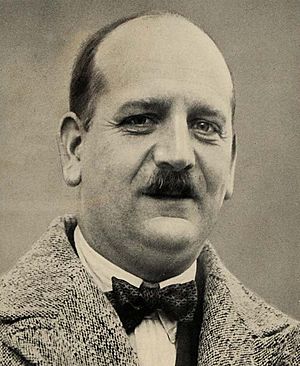Pierre-Étienne Flandin facts for kids
Quick facts for kids
Pierre-Étienne Flandin
|
|
|---|---|
 |
|
| Prime Minister of France | |
| In office 13 December 1940 – 9 February 1941 |
|
| Chief of State | Philippe Pétain |
| Preceded by | Pierre Laval |
| Succeeded by | François Darlan |
| In office 8 November 1934 – 1 June 1935 |
|
| President | Albert Lebrun |
| Preceded by | Gaston Doumergue |
| Succeeded by | Fernand Bouisson |
| Personal details | |
| Born | 12 April 1889 Paris, France |
| Died | 13 June 1958 (aged 69) Saint-Jean-Cap-Ferrat, France |
| Political party | Democratic Republican Alliance (1914-1940) |
Pierre-Étienne Flandin (born April 12, 1889 – died June 13, 1958) was an important French politician. He was a conservative leader during a time known as the Third Republic in France. He even served as the Prime Minister of France for a period.
Contents
Early Life and Political Start
Pierre-Étienne Flandin was born in Paris, France. He became a military pilot during World War I. After the war, he started a career in politics. He was part of the Democratic Republican Alliance (ARD) political party.
Important Government Jobs
Before becoming Prime Minister, Flandin held many different jobs in the French government. These jobs were called "cabinet posts."
- In 1924, he was the Minister of Commerce for a short time.
- In 1931 and 1932, he served as the Minister of Commerce and Industry.
- He also worked as the Minister of Finance.
- From February to November 1934, he was the Minister of Public Works. This job involved managing big building projects for the country.
Becoming Prime Minister
In November 1934, Pierre-Étienne Flandin became the Prime Minister of France. He was only 45 years old, which made him the youngest Prime Minister in French history at that time. His time as Prime Minister lasted until June 1935.
Key Agreements During His Time
Even though his time as Prime Minister was short, some important agreements were made. These included:
- The Franco-Italian Agreement of 1935: An agreement between France and Italy.
- The Stresa Front: An agreement between France, Britain, and Italy to stand against Germany's actions.
- The Franco-Soviet Pact: An agreement between France and the Soviet Union for mutual help.
World War II and Later Life
In March 1936, Flandin was the French Foreign Minister. This was when Adolf Hitler ordered German troops to reoccupy the Rhineland. This area was supposed to be demilitarized after World War I. Flandin supported a policy called "appeasement." This meant trying to avoid war by giving in to some of Hitler's demands. This approach later caused problems for his career.
Role During Vichy France
In December 1940, during World War II, France was partly occupied by Germany. The part of France that was not occupied was called Vichy France. The leader of Vichy France, Philippe Pétain, appointed Flandin as Foreign Minister and Prime Minister. This happened on December 13, 1940. However, Flandin only held these positions for about two months. He was replaced by François Darlan in January 1941.
After Politics
Pierre-Étienne Flandin passed away on June 13, 1958. A street in the town of Avallon was once named after him. However, in May 2017, it was renamed in honor of Jo Cox, a British politician.
Flandin's Government (November 1934 – June 1935)
When Pierre-Étienne Flandin was Prime Minister, he had a team of ministers who helped him run the country. Here are some of the key people in his government:
- Pierre Étienne Flandin – Head of the Government
- Georges Pernot – Deputy Head and Minister of Justice
- Pierre Laval – Minister of Foreign Affairs (dealing with other countries)
- Louis Maurin – Minister of War (in charge of the army)
- Marcel Régnier – Minister of the Interior (in charge of internal affairs and police)
- Louis Germain-Martin – Minister of Finance (in charge of money and economy)
- Paul Jacquier – Minister of Labour (in charge of workers' rights)
- François Piétri – Minister of Military Marine (in charge of the navy)
- William Bertrand – Minister of Merchant Marine (in charge of trade ships)
- Victor Denain – Minister of Air (in charge of the air force)
- André Mallarmé – Minister of National Education (in charge of schools)
- Georges Rivollet – Minister of Pensions (in charge of payments to retired or injured people)
- Émile Casset – Minister of Agriculture (in charge of farming)
- Louis Rollin – Minister of Colonies (in charge of French territories overseas)
- Henri Roy – Minister of Public Works (in charge of roads, bridges, etc.)
- Henri Queuille – Minister of Public Health and Physical Education
- Georges Mandel – Minister of Posts, Telegraphs, and Telephones
- Paul Marchandeau – Minister of Commerce and Industry
- Édouard Herriot – Minister of State (a special advisory role)
- Louis Marin – Minister of State
See also
 In Spanish: Pierre-Étienne Flandin para niños
In Spanish: Pierre-Étienne Flandin para niños
 | James Van Der Zee |
 | Alma Thomas |
 | Ellis Wilson |
 | Margaret Taylor-Burroughs |

